

Your Leadership Style – Changing or Adapting? It seems that there is a lot of talk in the business community about changing leadership styles.

However, the academic community has produced little research centered on changing leadership styles in the last two decades (see, e.g., Fazio, 1999) and little scholarly exploration in the last three (see, e.g., Zanecchia, 1985). Much of the recent literature about leadership style has been written about its specific application in the context of organizational change: transformational leadership[1] (n = 120, or 31% of all published doctoral research[2]). So, why the interest in changing one’s leadership style? The interest is because of the context in which it is applied: the organization. We know that organizations are systems (Scott, 1998); further, we know that organizations are complex dynamic systems (Axelrod & Cohen, 2000; Gharajedaghi, 1999). Resilience: The Other 21st Century Skills. Due to the interest of my post The Other 21st Skills, I decided to individually discuss each of the skills or dispositions I proposed that are in addition to the seven survival skills as identified by Tony Wagner.
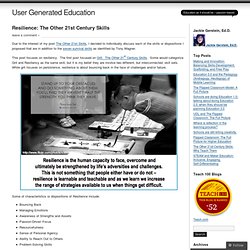
This post focuses on resiliency. The first post focused on Grit: The Other 21st Century Skills. Some would categorize Grit and Resiliency as the same skill, but it is my belief they are involve two different, but interconnected, skill sets. While grit focuses on persistence, resilience is about bouncing back in the face of challenges and/or failure. Some of characteristics or dispositions of Resilience include: Resilience Factors. 7 Habits Of Exceptionally Resilient People. Resilient people don’t give in to anger or despair when faced with a setback.
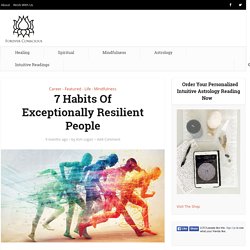
Instead, they tap into a greater purpose to bounce back stronger than ever. “They find resilience by moving towards a goal beyond themselves, transcending pain and grief by perceiving bad times as a temporary state of affairs,” says Hara Estroff Marano, editor at large of Psychology Today. Highly resilient people know how to bend to inevitable failures and tragedies and not break. Building Resiliency: How to Thrive in Times of Change. This guidebook is available for eBook purchase and download from Apple's iBookstore; Amazon's Kindle; Google eBooks; Sony iStore, and other reputable distributors of eContent.
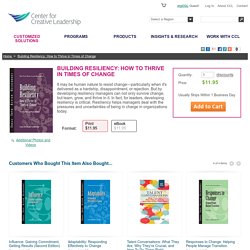
A Free Membership That Supports Your Leadership Needs - Join and Save Did you know that you can join the open and always-free myCCL at no cost and get a discount on this CCL Press Publication? CCL provides myCCL members with a 5% discount on CCL Press Publications like this just for being a member. Membership is complimentary in order to support our non-profit goal of connecting a world community of leaders and providing the best in leadership and leadership development for the benefit of societies world-wide.
Join the always-free myCCL online community and get access to this discount along with a host of resources to support you or your organization with its leadership needs. Dive Deeper and Get More Benefits Through myCCL PREMIUM Already a member? How to Manage Your Personal Energy. Building and Preserving Individual Resilience. Eight Keys to Life Hardiness and Resiliency. Elen Keller once wrote: “Character cannot be developed in ease and quiet.
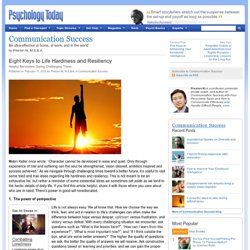
Only through experience of trial and suffering can the soul be strengthened, vision cleared, ambition inspired and success achieved.” As we navigate through challenging times toward a better future, it’s useful to visit some tried and true ideas regarding life hardiness and resiliency. A Navy SEAL Explains 8 Secrets To Grit And Resilience. Sometimes you just want to quit.

You know you shouldn’t but nothing seems better than crawling back into bed and hiding under the covers. (I am there right now, actually, with my laptop.) A Special Forces Officer Teaches You 5 Secrets To Overcoming Adversity. Life can be really difficult sometimes.
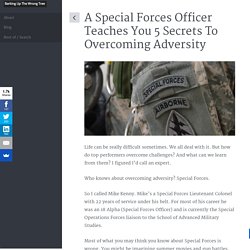
How To Be Resilient: 8 Steps To Success When Life Gets Hard. “Stick with it!”
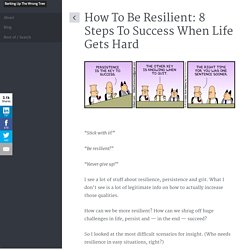
“Be resilient!” Stress Management. Overcome Stress and Challenge: 7 Mechanisms of Resilience for High Productivity. Timothy So, Msc, is a PhD candidate in Psychology in the University of Cambridge Department of Psychiatry.
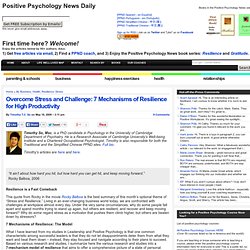
He is a Research Associate of Cambridge University's Well-being Institute and a Chartered Occupational Psychologist. Timothy is also responsible for both the Traditional and the Simplified Chinese PPND sites. Full bio. Perform Better Under Stress Using Self-Affirmation. Can thinking about what’s important to you improve your problem-solving powers?

Have a look at the following list of values and personal characteristics. The Neuroscience of Perseverance. Perseverance separates the winners from the losers in both sports and life. The Payoff of Perseverance. In the summer of 1994, in the tallest of Princeton University's ivory towers, Andrew Wiles was completing one of the most extraordinary odysseys in the history of math. For more than three decades, Wiles had been obsessed with Fermat's Last Theorem, a seemingly simple problem that had stumped mathematicians for 350 years.
French mathematician Pierre de Fermat had noted that although there are plenty of solutions to the equation X2 + Y2 = Z2 (for example, 32 + 42 = 52), there is no corresponding solution if the numbers are cubed instead of squared. In fact, Fermat scribbled in the margin of a book that he had "truly marvelous" proof that the equation Xn + Yn = Zn has no solution if n is any number greater than 2. Unfortunately, he never put his proof on paper. On getting up again: Rodney Mullen at TEDxOrangeCoast. You're Stronger than You Think. Thank you for spending some time with me at my new Psychology Today blog! It's an honor to be here, and I hope I can contribute something to the wonderful community of bloggers here. While I plan to blog on various topics, one theme I hope to revisit on occasion during my stay here is the potential within each of us, the amazing things we human beings can do when we put our minds and hearts to it.
5 Ways to Stay Mentally Strong When You’re Not Feeling “Good Enough” Email. 7 Ways to Stay Strong When Everything Goes Wrong. When life is “falling apart,” it could actually be falling together… for the very first time. Which is why it feels so darn uncomfortable. Consider that what’s in front of you may be serving you in valuable ways you don’t even understand right now. “Today, on my 47th birthday, I re-read the suicide letter I wrote on my 27th birthday about two minutes before my girlfriend showed up at my apartment and told me, ‘I’m pregnant.’
She was honestly the only reason I didn’t follow through with it. Suddenly I felt I had something to live for. That’s the opening paragraph of an email I received last night from a reader named Kevin. TEDxVictoria - Dr. Sean Richardson - Mental Toughness: Think Differently about your World. Abraham Lincoln's Brilliant Method for Handling Setbacks. What was the secret of Abraham Lincoln's success in dealing with people? Incredibly, this is not just a question that a business journalist would ask. Dale Carnegie himself--the legendary author of How to Win Friends and Influence People--asked the exact same question on page 8 of that famous book. Carnegie was in a unique position to know the answer. Four years before How to Win Friends came out, he authored a book called Lincoln the Unknown, which he spent three years working on. Coming Back From a Setback. 7 Ways to Bounce Back from Life’s Inevitable Setbacks. Treat Failure Like a Scientist. 5 Secrets To Overcoming Adversity.
The Art of Resilience. Book - Failing Forward: Turning Mistakes Into Stepping Stones for Success.